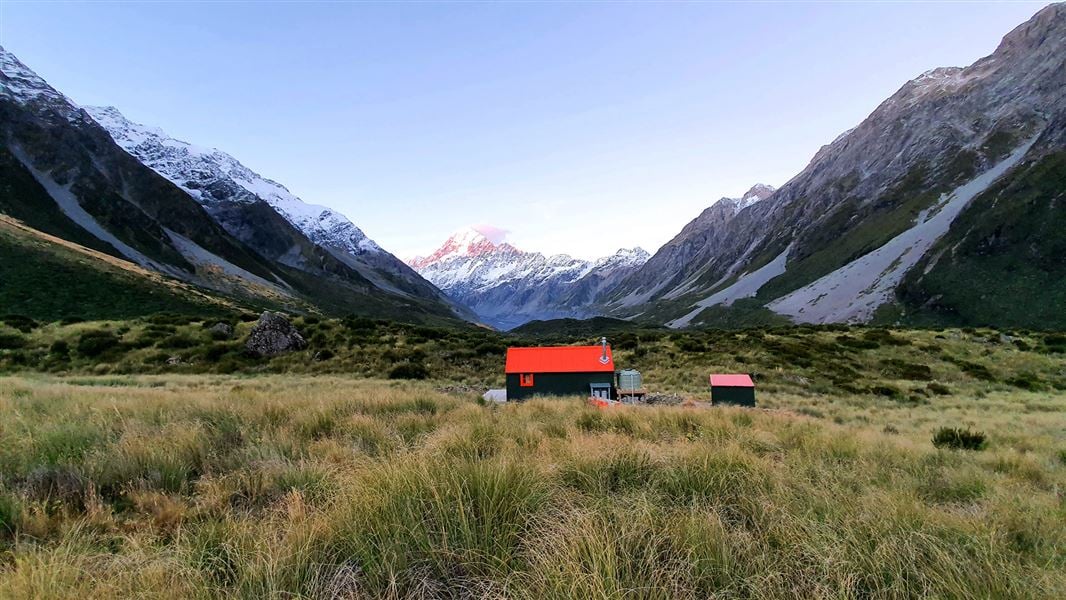Archived content: This media release was accurate on the date of publication.
Date: 03 May 2021
The hut, which first opened in 1910 and is the oldest in the National Park, was removed from its previous site above the crumbling moraine wall of the receding Tasman Glacier by helicopter in 2015.
It was stored in Twizel until its restoration by contractor Recreation Construction and flown back into a much more accessible location about two hours walk into the Hooker Valley.
DOC Aoraki Operations Manager Sally Jones says it’s fantastic to have the hut back in the national park where it can be well-used by visitors.
“The refurbished hut will open up the opportunity for a wide range of people to experience a night in the pristine alpine environment of Aoraki.”
“Until now, there hasn’t been a hut in Aoraki/Mount Cook National Park that is this accessible and caters for those with less experience in the outdoors.”
“While you don’t need to be a seasoned mountaineer to bag this hut, those planning to visit will still need a good level of fitness and to feel stable crossing uneven ground, as the last part of the walk into the hut follows a riverbed and there is no formed trail.”
Sally Jones says as well as providing visitors with this new hut accommodation, DOC has been working to upgrade the Hooker Track including a new toilet block at Stocking Stream.
Hooker Hut was originally built at the base of Copland Pass in 1910, as a base for mountaineers crossing the Divide, heading further onto the glacier, or scaling the peaks in the surrounding area.
Construction was planned by Peter Graham, the chief guide at the Hermitage at the time, and it was built with help from guides Jim Murphy and Darby Thomson.
It was moved three times between 1948 and 1994 due to cracking in the unstable moraine wall. Access was cut off to all but the most experienced hikers in 1994 when the track was washed out by heavy rain.
The hut was also struck by an avalanche in 2004. It had become rundown and needed some serious repair work when it was flown out in 2015.
Sally Jones says it was important to preserve this important piece of New Zealand mountaineering heritage.
“The hut has a long history, which includes multiple reports of ghost activity from those who have stayed there.”
“The refurbishment has taken care to maintain the hut’s heritage features such as the match-lined timber internal walls, while upgrading it to make sure it offers a comfortable stay for visitors.”
“Though the hut’s turbulent history is a reminder of the ever-changing natural environment here in the park, now further exacerbated by climate change, we expect its new location will prove more stable for years to come.”
The hut has eight bunks and costs $15 a night for adults and $7.50 for children aged 11-15. It is free for those aged 10 and below. Anyone planning to stay will need to book in advance by contacting the Aoraki/Mount Cook Visitor Centre. It will also be added to DOC’s online booking system in the coming weeks.
Those planning to visit Hooker Hut should check the weather forecast, wear sturdy footwear, take plenty of food and warm clothing, and tell someone about their plans. It’s recommended people stop by the DOC visitor centre in Aoraki/Mt Cook village to get the latest on conditions before heading out to the hut.
Background information
DOC manages a huge, world-class network of huts, campsites and lodges, to suit every budget and all types of visitors – from young families to mountaineers. These facilities offer people the chance to overnight in nature in some of the most spectacular parts of Aotearoa.
New Zealand’s network of around 950 conservation huts offers people the chance to overnight in nature in some of the most spectacular parts of Aotearoa and is a unique piece of heritage in itself. They are managed on behalf of all New Zealanders by DOC and others such as the Back Country Trust.
